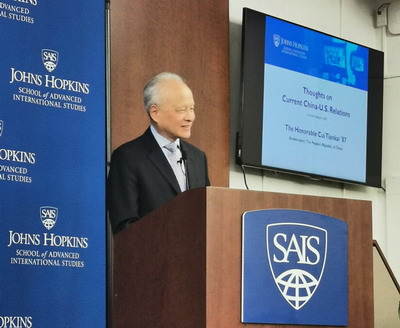 中文
中文
On September 11, Ambassador Cui Tiankai was invited to attend the China Forum hosted by Johns Hopkins School of Advanced International Studies (SAIS) and delivered a speech on current China-US relations. More than 300 people joined the event, including Dean Eliot Cohen of SAIS, Dean Kent Carder of SAIS Academic Affairs, former US Trade Representative Ambassador Carla Hills, former First Deputy Managing Director John Lipsky, China Studies Director Andrew Mertha of SAIS, SAIS students and US think-tank scholars.

Ambassador Cui said that it will be helpful to track the major trends behind changes and look at the basic questions in an age of global transformation. To better understand what China is doing, about what China intends to do, and what all these would mean to the United States, to China-US relations and the world, we need to have a closer look at the basic questions:
First, what China wants for itself. China's development is a modernization drive by an ancient civilization with thousands of years of history. This year marks the 70th anniversary of the PRC's founding, the 40th anniversary of China's reform and opening-up as well as the establishment of China-US diplomatic relations. China endeavors to realize the two centenary goals and satisfy the people's ever-growing needs for a better life. China is still a developing country and still has to redouble its efforts.
Second, what kind of world China hopes to see. Today's world is full of contradictions and challenges. There is a clear need for better and more effective international governance, but global coordination is weakening. We do need a better global perspective instead of Cold War mentality and power politics. On the special day of 9/11, we remember all the victims of terrorism, and should strengthen international cooperation to respond to security threats. Working together to build a community with a shared future for mankind is the most important goal for China's foreign policy, and it is also what we want to see and help build for the future.
Third, how we manage the relationship between China and the United States will to a large extent shape the future of the world. The two countries are different in history, culture, economic development and political system, and we have disagreement on some issues. But all these differences and disagreements should not be justification for confrontation and conflict between us. Rather, we should see them as opportunities and potential for complementarity and cooperation. China has been upholding and contributing to the international order. The mutual need and common interests between China and the United States far outweigh the differences we have, and it's our shared responsibilities to join hands on global challenges such as terrorism, climate change, epidemic diseases, etc.
Ambassador Cui emphasized that the reemerging of developing countries like China and India is a historical trend that nobody can stop, which is very good for world peace and prosperity. It's certainly foolish and futile to try to stop this trend, and no country should base its foreign policy on groundless suspicion, fear or even hatred. China and the United States should work together to build a relationship based on coordination, cooperation and stability. We should do our best to manage our differences on the basis of mutual respect, expand cooperation on the basis of mutual benefit, and build a stable and mutually beneficial relationship for the long run.
Ambassador Cui also answered the questions on issues such as China-US trade talks, Hong Kong, Xinjiang, etc.